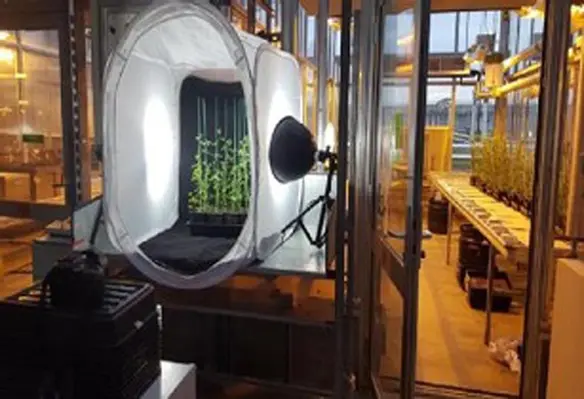Helping to promote the natural relationship between plants and bacteria could reduce reliance on environmentally damaging fertilisers, a study has found
As the population grows and crop yields are threatened by climate change, scientists are keen to help promote plant growth in a natural and sustainable way.
Published in Microbiome, researchers including those at the Universities of Warwick and Justus Liebig (Germany) have shown a new way to boost plant nutrient uptake and growth. This could reduce the need for fertilisers, an input to agriculture which can be harmful for the environment. Fertilisers can run into waterways, or get broken down by microbes in the soil, releasing the potent greenhouse gas nitrous oxide into the atmosphere.
The team of researchers investigated the efficiency of plant-bacteria relationships (also known as symbiosis or nodulation) – while also shedding light on how this natural phenomenon impacts interactions with other microbes in the soil.
Legumes interact with symbiotic bacteria (known as rhizobia) that ‘fix’ nitrogen from the air and provide it as nutrients to the plant. These microbes harness potential to help plants acquire soil nutrients to boost growth or develop stress resilience. These properties make legume crops relatively independent of the application of chemical fertilisers and offer an agriculturally sustainable approach to food production. Legumes can interact with many species of rhizobia, but the outcome of this interaction depends on the bacteria’s ability to fix nitrogen and the soil type – the ‘symbiotic efficiency’.
In the study, funded by the Biotechnology and Biological Sciences Research Council (BBSRC), the scientists identified the impact of different symbiotic efficiency on shaping not only plant growth and nutrition, but on the other microbes in the soil, which could help boost plant and soil health as ‘biofertilisers’. The work was carried out using a relative of peas and beans which can interact with different types of nitrogen-fixing bacteria, on a range of soil types representative of agricultural environments – including at the University of Warwick’s Innovation Campus, Stratford-Upon-Avon.
Using different bacteria strains, the team measured the plant’s molecular responses and the amount of minerals in the plant. The bacterial and fungal communities were also recorded in different locations: in the soil, around the root and inside the root. By combining all of these types and locations of data, an understanding of the impact of ‘symbiotic efficiency’ was established.
Professor Patrick Schäfer, Justus Liebig University, Gießen, Germany, said, “Plant growth and fitness greatly depend on symbiosis with a highly complex community of microorganisms (the ‘microbiome’), on the surface of roots. Our study showed that the nutrient status of soil affected the symbiosis between beneficial rhizobia – which fix atmospheric nitrogen in exchange for nutrients with legumes.”
Co-author of the study, Dr Beatriz Lagunas, School of Life Sciences, University of Warwick, said, “Our work demonstrated that symbiosis with different bacteria species can change the whole root microbiome. We uncovered the ability of nitrogen-fixing bacteria to install a plant-beneficial microbiome depending on their environment. We also identified microbial strains as part of this community which could be useful beneficial friendly-fertilisers for the future.”
Read the study here: https://microbiomejournal.biomedcentral.com/articles/10.1186/s40168-023-01592-0





